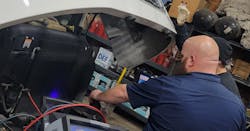Although R-134a is still the most common refrigerant seen in today’s repair shops, it’s only a matter of time before R-1234yf surpasses its predecessor. Since the adoption of R-1234yf, more and more vehicles coming into shops for repair work are no longer under warranty. This means shops can either accommodate the new(er) refrigerant or turn business away. It’s in the shop’s best interest – regardless of their size – to understand what tools and equipment are available to service vehicles using R-1234yf systems.
“[R-1234yf] is becoming the industry standard now,” says Will Pierce, Cornwell Tools distributor. “It was just a couple of manufacturers who used [the refrigerant] and now it’s across the board – every manufacturer has it.”
Pierce has been selling tools for Cornwell in northern Delaware for about three years now. He previously worked as a technician, but after two knee surgeries he decided to make a career change. His customer base ranges from heavy duty truck and car dealerships to body shops and construction companies.
Pierce has a history of doing well when it comes to selling A/C machines. In the past year, he sold a number of R-1234yf machines to smaller repair businesses. As more vehicles age out of their warranty, Pierce finds a unique opportunity providing services that previously only large dealerships could offer.
He claims his selling success stems from shop visits and taking notes on what type of A/C repairs technicians are working on. To make the sale, one must know the product and its benefits, he notes. As a mobile tool dealer, it’s important to understand why shops and technicians are needing to make the transition to service R-1234yf systems, as well as what tools and equipment are essential.
Phasing out R-134a
In an effort to reduce greenhouse gas emissions, the Environmental Protection Agency (EPA) began phasing out the use of R-134a in automotive A/C systems for the better part of the last decade.
“[R-1234yf] has been coming since 2013 in the United States when Cadillac installed it in the first vehicle [the Cadillac XTS], and gradually more and more manufacturers adopted it,” says Chuck Abbott, vice president of automotive sales at CPS Products. “Right now, it’s estimated that 89 percent of cars coming off production lines in the United States are getting R-1234yf.”
While both R-134a and R-1234yf refrigerants have similar properties and don’t require vehicle A/C system changes, they do have notable differences.
For one, their global warming potential (GWP), the measure of how much a given mass of a gas contributes to global warming, difference is pretty significant. R-134a has a GWP of 1,430. R-1234yf on the other hand is four.
Another difference is that R-1234yf is mildly flammable and brings with it additional safety concerns. It also includes an internal heat exchanger (IHX) to increase efficiency of the refrigerant and requires different oil.
What does this mean for repair shops?
The differences between the two refrigerants are considerable and will require repair shops to adjust their tooling and service equipment.
“With the mild flammability classification of R-1234yf, it caused new requirements for recovery, recycling, and recharge [RRR] Air Conditioning System (ACS) machines,” says Tim Wagaman, senior product manager of automotive service solutions at Bosch North America.
Safety is a main concern. A/C machines for servicing R-1234yf systems are designed with integrated safety features, CPS’s Abbott adds.
“For instance, there has to be a fan running continuously to exchange air inside the machine; since R-1234yf is heavier than air it kind of sinks to the ground,” Abbott says. “The fan is used to push any potential leaking flammable or refrigerant away from the work area.”
A/C machines also require having a refrigerant identifier on-hand to eliminate the possibility of refrigerant cross-contamination and to confirm refrigerant purity.
As with R-134a A/C machines, there are many options available for R-1234yf as well.
For service shops, Bosch’s Wagaman recommends Robinair’s Connected R-1234yf ACS Machine, as it offers full wireless capabilities for Wi-Fi or Bluetooth communication, enabling automatic machine software updates and capacities database downloads. It also manages and stores machine metrics and data related to services performed.
For mobile service, Wagaman suggests Robinair’s AC1234-4SL. It features a mechanical scale lock which eliminates the need to recalibrate the refrigerant scale after transporting the machine long distances.
CPS’s new FX1234V has a 12.67cc oil-less compressor, contamination resistant motorized ball valve flow control, and a 1-2-5 warranty (one year parts/labor, two year parts, and five years on the compressor).
It’s important to note that automatic oil injectors found on R-134a machines are no longer integrated on R-1234yf A/C machines.
“[Shops] now need to have the ability to manually inject oil,” says Mike Friesth, director of automotive tool and Equipment sales at GreatNeck Saw. “There is no such thing as a R-1234yf machine with automatic oil injection.”
For mobile tool distributors, Friesth highly recommends stocking oil injection tools on their truck specifically for R-1234yf.
Shops will also need to make sure they have the correct oil on-hand for R-1234yf systems.
“R-1234yf systems require PAG oils with very unique additives,” Abbott says. “If you use a R-134a PAG oil in a R-1234yf system, that compressor will not last long. Additional additives are required to maintain the lubricity in the oil and to keep it functioning.”
R-1234yf PAG oil is backward compatible to R-134a. Abbott recommends shops buy universal R-1234yf PAG oil to use across all platforms.
Friesth notes that for hybrid vehicles using R-1234yf, technicians must use POE oil, adding that it’s important to know which oil to inject to avoid serious damage.
What does this mean for technicians?
In addition to the above, being properly trained on both systems is essential. Technicians who repair or service automotive A/C systems are required to be certified under section 609 of the Clean Air Act by an EPA-approved program.
Even if a technician has already been certified, it is recommended they repeat certification as needed, as there have been updates regarding R-1234yf and its unique safety guidelines.
During the repair itself, technicians will notice that the time needed to complete the process will be longer. Aside from needing to identify refrigerant prior to recovering, there are some additional leak detection steps when charging, Bosch’s Wagaman notes.
Technicians are looking at roughly an extra 20 minutes to complete the process and should plan accordingly.
Tools to stock
Although stocking tools for both R-134a and R-1234yf would prove beneficial for mobile tool dealers at present, tools geared specifically towards R-1234yf systems are becoming more and more in demand. Carrying these products now will keep tool dealers – and their sales – at the forefront of industry best practices.
Electronic leak detectors, UV leak detectors, as well tools to inject A/C oil back into the system will need to be compatible for use with R-1234yf systems.
“Since the refrigerant is a different chemical compound, leak detectors that were used for R-134a will not work on R-1234yf,” CPS’s Abbott says.
Tools such as vacuum pumps and manifold gauges do not have to be specific for R-1234yf, however they will require new fittings, or couplers, to be able to connect to a R-1234yf system. R-1234yf systems have different service fittings to prevent cross-contamination with other refrigerants.
Selling tips
When positioning oneself to take advantage of a sales opportunity, education is valuable.
“A successful mobile distributor is going to do everything he can and to always stay abreast of the changing industry,” GreatNeck Saw’s Friesth suggests. “You can’t always rely on what’s new and cool … sometimes you have to go up to [customers] and help them understand what they are looking at and how they need to be positioned as a technician to take advantage of those opportunities that come through their bay.”
Knowing the difference between R-1234yf and R-134a, along with what tools and equipment to carry to capture those opportunities is important, Friesth adds.
For Cornwell Tools dealer Pierce, if you’re not too familiar with A/C repair products used at a particular business its best to go into the shop and ask the technicians directly.
“Ask them what they are using and ask them what they see themselves using,” he says. “Go in and talk to the [technicians], listen to what they are saying, and show them the benefits (know the product beforehand). I’ve gotten more sales like that – by going in and seeing an old machine and saying ‘hey, when are you guys going to upgrade?’ or ‘What are you guys thinking for this upcoming season?’”
When asking about R-1234yf specifically, he’ll remind the shop that it’s coming and it’s best to get prepared now instead of losing money by having to send the repair work someplace else.
Pierce always tries to keep one A/C machine, or two if he is able, on the truck. That way he is prepared when a machine goes down and a technician needs one along his route. He may also use it as a demo to show customers how easy it is to use, especially for those who are hesitant to purchase one.
Although A/C machines are used and sold throughout the year, in just under the three years he’s been selling tools he has noticed quite the increase in demand as soon as the weather warms up.
“As soon as it starts to warm up slightly in early spring is when [business] starts to [pick up],” he says. “Sales will spike pretty heavily where I will clear a shelf off for [A/C tools and equipment].”
This is when drivers start to realize their A/C didn’t work for last year or that its not working this year, and will go to the repair shop, he notes.
In addition to selling A/C tools and equipment, Pierce adds that selling the service after the sale is just as important.
“I sell the service,” he says. “Honestly, there are probably others that can beat my pricing, so I build really good relationships with my customers. They trust me and know that whatever product I sell, I stand behind. The support after the sale is what I push the most.”



